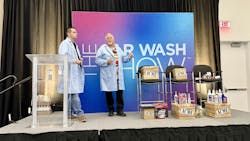iFLEX 2025: Effective Upselling Strategies Increase Ticket Averages
In a PAMA education session presented Sunday at iFLEX 2025 at The Car Wash Show, Lucas Oil Center Owner/Founder Bill Floyd and Operations Manager Matt Harter shared some of their best secrets for increasing ticket averages.
Dressed in ACME lab coats and armed with a litany of products on stage, Floyd and Harter kept attendees engaged with a colorful presentation as they dispensed their wisdom.
The first secret of upselling, they said, is that salesmanship starts at the curb. A manager’s shift begins as soon as he or she pulls into the parking lot. Is there trash on the ground? Is the landscaping overgrown? Look at your shop through the eyes of a customer, from the exterior to the lobby.
“Take pride in your work area,” Harter said.
Keeping your shop is only half the battle, though. Harter and Floyd said employee appearance and hygiene matters too. You can’t sell if you smell, Floyd said.
“If your clothes smell like a barnyard animal, you’re not going to have a successful interaction with a soccer mom driving a $75,000 SUV,” said Floyd. “It seems simple, but it’s all part of the customer experience.”
Employee body language also makes a difference, Harter added. To illustrate his point, he showed two versions of a scene portraying good and bad customer interactions. Harter explained why creating a warm and welcoming environment is appreciated by customers. At Lucas Oil Center locations, employees sit with customers to have conversations so the customers stay comfortable.
Salesmanship 101
Floyd and Harter offered a series of tips for selling:
- Strengthen your bonds with customers and build trust.
- Mention recommendations, but don’t be pushy.
- You can’t sell an empty shelf, so keep inventory properly stocked.
- You can’t sell if you don’t ask.
- Be knowledgeable and confident about the products you’re selling.
Sales opportunities begin as soon as customers check in, Floyd said. Three potential upselling opportunities he discussed were wipers, car washes, and tire rotations.
Constructive questions that get customers thinking about the performance of their vehicle and its parts are more likely to spur sales, Floyd said. For example, he said instead of asking, “Would you like wiper blades?”, a more engaging approach is to ask customers, “How well do your wipers work in the rain?”
The same principle applies for other products, Floyd said, listing engine and cabin air filters, bulbs (“a great revenue stream,” noted Floyd), fuel and oil additives, fuel system service, and flush services.
Cabin air filters are an especially popular item once customers are asked about the air flow in their vehicle and the presence of unwanted odors. Checking light bulbs is a good way to build trust with customers because it shows you are looking out for them, Floyd said. In many cases, customers don’t realize they have a burned out bulb, putting them at risk of receiving a ticket.
Using fuel additives and getting fuel system services are the types of preventative steps vehicle owners can take to ward off the need for costly repairs, Floyd said. As for oil additives—derisively labeled by some customers as “snake oil”—it’s on quick lube shops to explain the products’ benefits, such as reducing engine wear and quieting engine noise.
More Potential Services
Offering tire rotations can generate as much as an extra $300 to $500 per day for quick lubes. Floyd and Harter strongly advocated for adding tire rotations, explaining that they provide a high profit margin because there is no cost of goods and techs are already on the clock. It’s an opportunity missed by a lot of quick lubes, the duo said. Moreover, tire rotations provide a potential gateway to brake pad and rotor replacement services.
With more customers opting for longer intervals between oil changes, tire rotations can be a part of each visit, Floyd and Harter said.
For quick lube shops that also offer car wash services, monthly subscriptions can appeal to customers for their convenience and cost effectiveness. For customers who are hesitant to commit to a monthly pass, coupon books—which can be sold through partnerships with local schools and organizations—can be an attractive alternative, Floyd said.
About the Author
Tom Valentino
Editor
Tom Valentino is the editor of National Oil and Lube News. A graduate of Ohio University, he has more than two decades of experience in newspapers, public relations and trade magazines, covering everything from high school sports to behavioral health care. Tom’s first vehicle was a 1990 Mazda 626, which he used to deliver pizzas in the summer after graduating high school. Today, he drives a 2019 Jeep Compass, which usually has a trunk full of his daughter’s sports gear. In his spare time, Tom is an avid Cleveland sports fan and a volunteer youth sports coach.
Don't miss Tom Valentino's next article. Sign up for NOLN's Quick Lube Report and This Month in NOLN newsletters.

